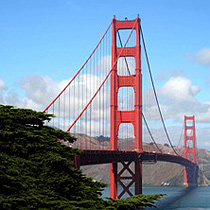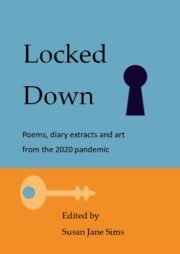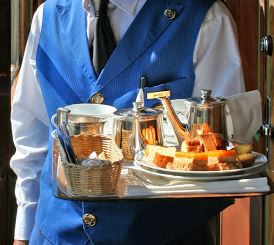• Archive of all Poetry Space showcases
Editor: Rosie Jackson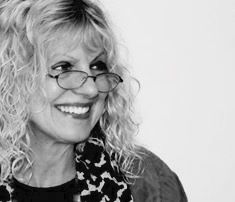
Rosie Jackson lives near Frome, Somerset and is a Hawthornden fellow, 2017. She’s taught at the Universities of East Anglia, Nottingham Trent, West of England, Skyros Writers’ Lab and Cortijo Romero. In 2017 she won the Stanley Spencer poetry competition and came 3rd in the Hippocrates competition. Her poems have appeared in journals and anthologies. What the Ground Holds (Poetry Salzburg, 2014) was followed by The Light Box (Cultured Llama, 2016). Her prose books include Fantasy: The Literature of Subversion, The Eye of the Buddha, Frieda Lawrence, Mothers Who Leave and a memoir, The Glass Mother (Unthank, 2016). You can read and hear her work on her website.
Editor’s overview:
What struck me, as I read and re-read the very varied submissions, were the seemingly contradictory pleasures I look for in poetry: being touched by the passion or compassion of poems with a level of deep feeling; admiring the joy of well-crafted poems, which disguise their skill, or are in love with language but avoid being over-written; savouring poems written ‘in yesterday’s blood’, where experience has been digested and understood, rather than leaving things hanging out raw; yet at the same time loving most those poems which take risks, which jolt me with a sense of the unexpected, whether that’s a new way of seeing, an unusual perception or vision, or an original way of using language.
So the poems here are a mixture which reflect these different tastes – some of understatement and restraint, where the reader is quietly invited in, others arriving after loss and trauma at distilled moments of meaning or epiphany, a few which are wilder and bolder. Sarah Manguso writes that ‘The purpose of being a serious writer is not to express oneself, and it is not to make something beautiful, though one might do those things anyway…The purpose of being a serious writer is to keep people from despair. If you keep that in mind always, the wish to make something beautiful or smart looks slight and vain in comparison. If people read your work and, as a result, choose life, then you are doing your job.”
Most of all, then, I went for those poems which are on the side of life, of love, of light and affirmation in the face of the darkness which surrounds us.
Please scroll down past the poems to read Rosie’s comments on the ten selected poems.

Photograph by Sue Sims, taken at Art and Science Museum, Singapore.
A Mexican Wave
spreads like a wildfire fifty miles a day
Arctic to Algonquin and beyond
a shout of colour from a brush run riot
shocking maples, quaking aspen trees
Arctic to Algonquin and beyond
fingers of night frost polishing the stars
shocking maples, quaking aspen trees
red oaks, acers, liquidambar, larch
fingers of night frost polishing the stars
crisping the nutty flavours of the day
red oaks, acers, liquidambar, larch
resin, bletted medlar fruit and musk
crisping the nutty flavours of the day
under skies of lapis lazuli
resin, bletted medlar fruit and musk
apples, aubergines and butternut
under skies of lapis lazuli
silos, drooling streams of golden grain
apples, aubergines and butternut
ropes of bindweed berries, damson wine
silos drooling streams of golden grain
a shout of colour from a brush run riot
racing in scarlet, gold and purple flames
spreads like wildfire fifty miles a day
Jenna Plewes
From collection, Pull of the Earth published by Indigo Dreams Publishing, 2016.
Lost in Galloway
looking for those
who know the way
along the meanders
of this well-trodden path
I am west of the pink-footed
geese on Kiln loch,
who seeing not me
honk and speak to their kin due north east.
Along the track of dying larch
I’m east of that red squirrel
somersaulting the loch wall
intent on hazel’s husk –
kernel secrets only he knows.
The red-kite beneath by the burn
hovers north,
swivels on its hawk-pole star
and I, soon south,
chill in the high wooded valley below
the artist’s town,
where south-west
high in a trick of light-stippled glade
a roe-deer doe
nuzzles a nest of grass-leafed moss.
In her zone
she quietly feeds,
lifts her head,
disdainfully gazing
at what must be me.
Early evening, north-east
on the treacherous mud flats
Nith estuary’s haunted –
wheeling black scripts left by
Barnacle geese scrolling their skies.
Soon they’ll be flown,
heading far away
north to a beloved summer home.
This must be my turning.
Julie Sampson
.
When Lydia brings you flowers
she offers you one by one
a strange familiar stem –
green stalk, bright arrow –
it’s a kind of dance
a quiet duet
iris, tulip, rose –
you do not know their names
but hold each flower
like a fine quill pen
as an artist, to gauge perspective,
holds a brush, just so –
you arrange them
in the vase, settle them
in water, according
to their colour, size, bloom –
as a hostess welcomes guests
as once in conversation
your careful, chosen
words lit up a room
Jeff Skinner
Fragments
You’re always Mum – insisting we share
my discovery of cocoa, the chocolate
I bring like Cortès each Tuesday I visit.
Sometimes I fear the day I forget
will be the day you remember
but I need not fret. When we leaf
through your albums it’s clear
your memory’s shot. Every picture
no longer tells a story; you never were
in Rome or saw Vienna; the squares
of Salamanca are in pieces
the ones we break together
a puzzle we can savour, if I unfold
the silver foil like a map
Jeff Skinner
Elijah! *
last evening
Elijah the prophet
visited me
he arrived with
the sunset
on the early
spring wind
I poured burgundy
wine into the
turquoise clay goblet
we shared the wine
Elijah and me
we lit the candles
at my altar
when the wine
was all finished
I was ready for bed
Elijah asked me
if he could stay over
in the guest bedroom
where the cat Simone
sleeps on the high-up dresser
she jumps up there
from the bed
to see out the window
I have plenty
of extra blankets
and pillows
so Elijah was
my overnight guest
he sang me a lullabye.
Sharon Lia Robinson
* A glass of wine is traditionally placed on the Passover Seder table for Elijah, and during the Seder the door is symbolically opened for him.
Seals in the Currents
In the currents off Bardsey
something quick and slick
dives through forests
of swaying strap seaweed,
an oilskin torpedo,
limpid eyes and whiskers
intent on sandeels.
whale-road-divers
underwater-acrobats
A seal city on the rocks
in the bay silvers the shore,
atolls of blubber lolling in sunglare.
A sound of discord as bulls fight
for the right to mate,
slash and tear at each other
in a blood-stained brawl.
fishing-boat-chasers
lobster-crunchers
Plush pups lounge in lanugo furs,
plump from rich milk,
eyes obsidian pebbles.
A blunt nose bobs out of the tide
like a bottle as a seal sleeps,
watched only by a squat lighthouse.
The bones of 20,000 saints sleep on.
foam-bathers
surf-gliders
Annest Gwilym
Notes
Bardsey Island is known as the island of 20,000 saints because it was a place of pilgrimage from the early middle ages onwards. Three pilgrimages to Bardsey were equivalent to one to Rome.
Bardsey Island is called Ynys Enlli in Welsh, which means Island in the Currents.
NO
Two letters
One simple word
Helps recover
One’s whole world
Defines boundaries
Deletes threats
It is not an expletive
But it is more feared
The more it’s uttered
The better it’s heard
Takes time to practice
Worth it, once learned
It’s defined as negative
It enables the positive
So hard to say
But it’s okay
Say it without fear
Say it loud and clear
NO
There u go
Namita Sethi
The View from Up Here
the dormant cedar playset of my backyard
has outlived my seventeen years
it recalls rusty splinters and
my bestfriend’s timeless laugh
honey-ebony hairs lacing into knots
with mud manicures on coral palms
and of course, the dusty backyard sprinkler
of my childhood’s artificial rain
years say goodbye to me
dancing too soon away
the backyard swing is barely brushed
the wood rots in rain
lazy spiders lounge at its hems
while webs paint the slide corpse
all it knows now is weather since love
and grass accept their neglected fate
upstairs in my second story bedroom
next to the window that looks out
a heavy oak desk that bears the weight
of my expectations on
it’s back and right now I can see
my backyard and that yellow slide
and the green monkey bars that
my dad bought at Home Depot
the sharp blades of grass that
I haven’t sprawled in for too long
and the steep wooden ladder tracing a
sadistic canvas carved on windowpane
this is the view from up here
where I recall a time when
my mother and my father were gods
and uncertainty was just an idea.
Alice Heyeh
Outside in
The walls are high shelved with books,
the kelim is faded, fringes tattered.
Three vases stand on the mantelpiece
and a bust of Chateaubriand,
an ivory fisherman on the hearth.
On one shelf is a silent clock.
A small pastel by the door
brings in the coast of Normandy
and the smell of the sea.
Rosalie Challis
Blue Hour
It is an ordinary evening
a late sun dipping
an apostrophe of light
playing chase with waves
as I walk the shore road
In front of me your shadow
arms like melting stars
full of mysteries
You left with
the dandelion clocks,
for weeks I woke to the smell
of you gone, the earth spinning
its backscatter of love.
Eileen Carney Hulme
From the collection Stone Messenger, published by Indigo Dreams Publishing
A Mexican Wave
I was struck by the vibrant language here, the celebration of rich natural colours spreading round the globe like a Mexican wave celebrating life, and the confident, emphatic use of the pantoum form, which creates a tight structural bowl for all the lush fruit and sensuality. The sounds of words here are as important as their meaning, and I was thrilled to learn a delicious new word – ‘bletted’.
Lost in Galloway
Human presence is almost irrelevant in this lyrical evocation of a world of geese, squirrels, kites, does, natural beauty. That the poet literally takes bearings from them and not from any map is an original touch, leading to the brilliant seemingly casual throw-away last line. And I loved the memorable ‘wheeling black scripts left by Barnacle geese scrolling their skies.’
When Lydia Brings You Flowers
In this restrained, deceptively simple image of a woman receiving flowers whose names she has forgotten, we have a poignant, breathtakingly tragic scene of a woman whose words and former eloquence are gone. The under-statement and the beauty of the imagery turn what could have been a predictable poem about age and memory-loss into something more classical, graceful, once again proving the wisdom of emotional restraint and that less is more.
Fragments
I knew this was the same poet as the previous one, with the same essential heart-aching scene, but what is new here is the clever way that cliches of loss are deliberately turned on their head – ‘every picture no longer tells a story’ – to show a life in pieces and a family vainly trying to hold things together. Once more the images and language are simple but deeply moving and memorable.
Elijah!
I chose this for its daring simplicity and vision, which reminded me of Blake’s angels in trees, and for the way the transcendental and domestic are dramatically spliced together, so that the spirituality is earthed. I’d have liked it to be longer and for the ending to be less of an anti-climax, less sentimental (somehow I associate Elijah with less restful things than a lullaby), but maybe that is also part of its risk-taking.
Seals in the Currents
Fabulous close and detailed observation of seals on their rocks – ‘plush pups lounge in lanugo furs.. eyes obsidian pebbles.’ The carefully chosen language and metaphors seem to capture their mobile forms, everything wet and slippery, sustaining interest and delight without the unnecessary distraction of too much human focus.
No
Ironically, given what I’ve said about affirmative poems, this one with such a simple negative title and command, insisted on being included. That’s because in its stark, unapologetic imperative, this is a powerfully clear statement about making boundaries, about self-protection, all the ‘no’s’ we have to believe we can hold and make before we choose our ‘yes’s’. It’s the last line that clinched it for me: casual, assuring, humorous, encouraging, definitive.
The View From Up Here
A portrait of a 17 year-old looking out on her backyard and the furniture of her childhood. I feel this captures that rite of passage between childhood and adulthood, when parents are no longer infallible, and all the paraphernalia of youth – captured here with intense, specific, vocabulary and imagery – seems to come from some other lifetime. To sense the irreversibility of the passage of time is a commonplace in poems by older poets, but to find it done so well by a younger one is rare and welcome.
Outside In
This reminded me of one of Ezra Pound’s imagist poems, taking one central image and letting it speak volumes. Ordinary homely objects convey a human scene, but one painting on the wall holds all the unlived life in the room, and makes the barrier between inside and out permeable. Controlled, contained, sensitive, deeply suggestive: an ‘art’ poem with a difference.
Blue Hour
Both beautifully written and deeply felt, this is a delicate poem of love and loss. Everything, including the title, is modest yet far-reaching, not indulging in grief but honouring the lost beloved and capturing the evanescence of human life and relationships in the familiar yet apt metaphor of flimsy dandelion seeds; last lines are always important and the ending here stamps this unassuming poem with brilliance.
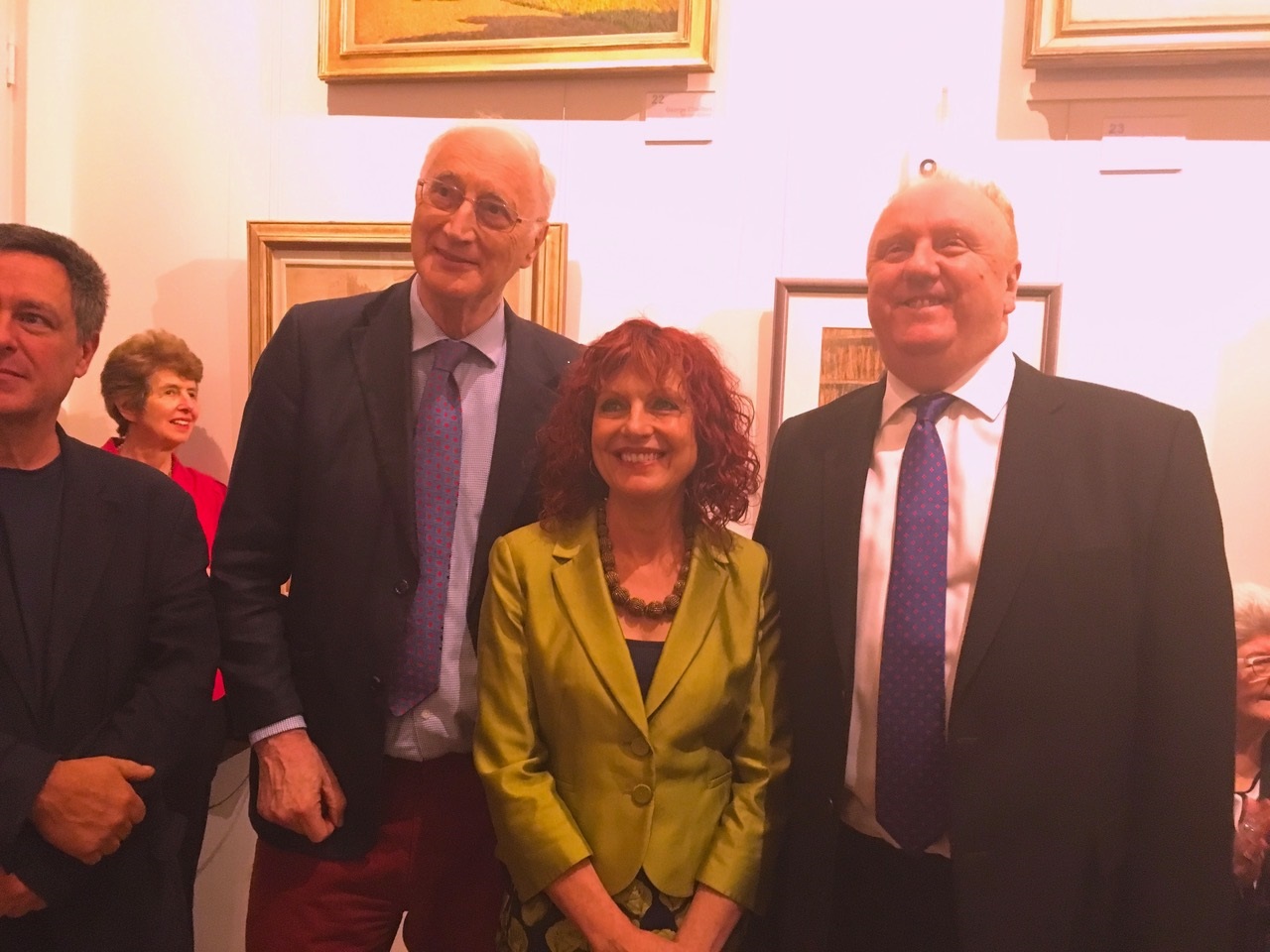
2017: Rosie receiving her prize at the Stanley Spencer Poetry Competition.

